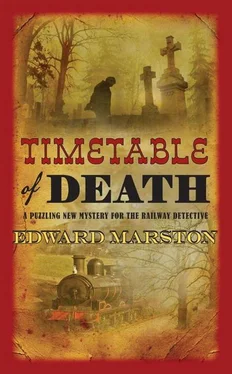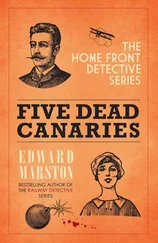Edward Marston - Timetable of Death
Здесь есть возможность читать онлайн «Edward Marston - Timetable of Death» весь текст электронной книги совершенно бесплатно (целиком полную версию без сокращений). В некоторых случаях можно слушать аудио, скачать через торрент в формате fb2 и присутствует краткое содержание. Год выпуска: 2015, ISBN: 2015, Издательство: ALLISON & BUSBY, Жанр: Исторический детектив, на английском языке. Описание произведения, (предисловие) а так же отзывы посетителей доступны на портале библиотеки ЛибКат.
- Название:Timetable of Death
- Автор:
- Издательство:ALLISON & BUSBY
- Жанр:
- Год:2015
- ISBN:9780749018122
- Рейтинг книги:4 / 5. Голосов: 1
-
Избранное:Добавить в избранное
- Отзывы:
-
Ваша оценка:
- 80
- 1
- 2
- 3
- 4
- 5
Timetable of Death: краткое содержание, описание и аннотация
Предлагаем к чтению аннотацию, описание, краткое содержание или предисловие (зависит от того, что написал сам автор книги «Timetable of Death»). Если вы не нашли необходимую информацию о книге — напишите в комментариях, мы постараемся отыскать её.
Timetable of Death — читать онлайн бесплатно полную книгу (весь текст) целиком
Ниже представлен текст книги, разбитый по страницам. Система сохранения места последней прочитанной страницы, позволяет с удобством читать онлайн бесплатно книгу «Timetable of Death», без необходимости каждый раз заново искать на чём Вы остановились. Поставьте закладку, и сможете в любой момент перейти на страницу, на которой закончили чтение.
Интервал:
Закладка:
‘You’ve put all that behind you, Father. Enjoy your retirement.’
‘I need something to keep me active.’
‘You talked about getting an allotment.’
‘That wouldn’t suit me.’
‘What would attract you?’
‘You know the answer to that. Whenever he starts a new case, I’d like Robert to call on me for advice. I’ve lived and breathed railways, Maddy. I know things.’
‘Then you can discuss them with Silas Pegler. You’ll have shared memories.’
‘You can’t have a serious talk with Silas,’ he complained. ‘He’s a likeable old fellow but he’s got no conversation.’
What that meant, she knew, was that her father dominated any discussion with his friend and allowed him few opportunities to speak. It was a situation she’d seen with virtually all of his railway colleagues. Andrews was a fluent talker but a bad listener. Eager to send him on his way, she made no comment and he eventually took his leave. They exchanged a farewell kiss then she waved him off from the doorstep. His departure was timely. Five minutes later, Victor Leeming arrived. He and Madeleine adjourned to the drawing room. The sergeant was in an almost ebullient mood.
‘How did you get on with the superintendent?’ she asked.
‘I put him in his place for once.’
‘You told me that it was like facing a firing squad.’
‘I was the one with a rifle in my hands this time,’ he bragged. ‘When he said that there was no need to find Lydia Quayle, I made him see that it was vital.’ His buoyancy faded. ‘We’re now left with the small problem of exactly how to find her, of course. London is a huge city with a population of over three million. She could be anywhere.’
‘Didn’t Robert give you any instructions?’
‘He simply told me where to start.’
‘And where is that?’
‘We have to visit some libraries,’ he explained. ‘How much has the inspector told you about the case?’
‘His letter was very detailed,’ replied Madeleine. ‘I know about the friendship between Miss Quayle and the gardener, and I know that she was sent abroad by her father to keep the two of them apart.’
‘Inspector Colbeck learnt something about her travels from Burns. He said how fondly she’d always talked of Italy. That’s the most likely place she’d have gone. Burns had no way of confirming it, of course, because they’d lost touch completely, but it’s logical. He told the inspector something else about her as well.’
‘What was that, Victor?’
‘Lydia Quayle loved reading. She was always talking about the latest thing she’d read. When it was the gardener’s birthday, she gave him a book of poems.’
Madeleine smiled inwardly. Early in their relationship, Colbeck had given her a poetry anthology. She had read something from it every night. In her case, it had been a treasured gift but she doubted if the gardener got quite as much pleasure out of the volume he’d been given.
‘I can see how my husband’s mind is working,’ she said. ‘A young woman with a passion for books is likely to borrow some on a regular basis. If she lives alone, she’ll have plenty of time for reading and she’s now free from the social commitments that she must have had when she lived at home with her parents.’
‘I’m not a reading man myself,’ said Leeming, apologetically. ‘I don’t have a leaning that way. As for libraries, I wouldn’t even know where to find one.’
‘Then we must start with the London Library. That’s in St James’s Square.’
‘I’ve never had call to go there.’
‘There’s the British Museum, of course, but that’s for more scholarly books and I don’t think you’re allowed to borrow them. It seems to me as if Miss Quayle would be more interested in reading novels, books of poetry or something about Italy, perhaps. She may also buy books, I daresay, but an avid reader would also belong to a library.’
‘You’re starting to sound like the inspector.’
‘I’m trying to think like him, that’s all.’
‘I never tell Estelle anything about my work. It would only upset her to know how much danger we come up against. Besides, there’s no point. She wouldn’t be able to do what you can do.’ He grimaced. ‘I hope we’re lucky, Mrs Colbeck. I’ve just thought what would happen if we don’t find the woman.’
‘You’d have to go back to the superintendent and admit that you failed.’
Leeming gulped at the prospect. ‘It’d be worse than a firing squad in that case. He’d let loose the artillery on me.’
An atmosphere of gloom and apprehension pervaded the whole house. Servants moved about in silence as if frightened to speak. The murder of Vivian Quayle had had a profound effect on them and on those who worked outside on the estate. If someone as important and as well protected as their master could be killed, they worried about their own safety. Family members and servants all wore funereal attire. When Agnes helped her mother slowly downstairs, there was a rustle of black taffeta. Though her daughter advised against it, Harriet Quayle insisted on being taken out for a drive. Having been penned up indoors for days, she said that she felt that the house was oppressive and that she needed fresh air.
‘At least, let me come with you,’ volunteered Agnes.
‘I prefer to be alone.’
‘But what if you’re taken ill?’
‘Stop fussing over me, Agnes.’
‘I worry about you.’
‘If anything untoward happens,’ said Harriet, ‘I’m sure that Cleary will bring me back at once. I just want to experience freedom .’
It was a strange word to use but Agnes knew that her mother was more than capable of coming out with odd remarks or making peculiar demands. There was a capricious streak in her that had not been entirely quelled by almost forty years of marriage to one of the leading industrialists in the county. The butler was there to open the door wide for them and the driver was standing beside the landau with its door opened and its step folded down. When he saw the old lady emerge, he hurried across to her and offered his arm. Harriet took it gratefully.
‘Thank you, Cleary,’ she said. ‘You can let go of me now, Agnes.’
‘You’re not to stay out for long, Mother.’
‘I just want to be able to breathe again.’
‘Take good care of her, Cleary,’ said Agnes.
‘Yes, Miss Quayle,’ he replied.
Cleary was a tall, thin, lithe man in his thirties with a gaunt face and a dark complexion. Though he’d been born in the area, he had a slightly foreign look to him. After helping his mistress into the carriage, he put a blanket over her legs even though it was a warm day. Agnes watched as he climbed up on the box seat and used a whip to set the horses in motion. As the vehicle swept off, its wheels made a loud scrunching noise on the gravel that sounded almost sacrilegious near a house of mourning.
Agnes went back into the building in search of her younger brother. She found him in what had once been their father’s study, poring over some documents. When he looked up at her, she gave a sigh of despair.
‘I couldn’t stop her, Lucas.’
‘We must give Mother her head.’
‘She can be so determined.’
‘It’s a family trait,’ said Lucas Quayle. ‘You don’t build empires with a faint heart. Everything that Father achieved would have been impossible without Mother. Until her health collapsed, she helped him a great deal in the early days. That’s why it was such a strong marriage.’
Agnes made no reply. Talk of marriage always embarrassed her. Shorn of her own chances by her lack of appeal to the male sex, she’d been compelled to look after her mother and put up with the old lady’s idiosyncrasies. Nobody else in the family, she felt, understood how unfair it was on her. She got scant reward and was taken for granted by everyone. She recalled how quickly her mother had abandoned her to take Cleary’s arm instead. That kind of petty rebuff had happened a hundred times. It might, however, be about to end soon.
Читать дальшеИнтервал:
Закладка:
Похожие книги на «Timetable of Death»
Представляем Вашему вниманию похожие книги на «Timetable of Death» списком для выбора. Мы отобрали схожую по названию и смыслу литературу в надежде предоставить читателям больше вариантов отыскать новые, интересные, ещё непрочитанные произведения.
Обсуждение, отзывы о книге «Timetable of Death» и просто собственные мнения читателей. Оставьте ваши комментарии, напишите, что Вы думаете о произведении, его смысле или главных героях. Укажите что конкретно понравилось, а что нет, и почему Вы так считаете.












